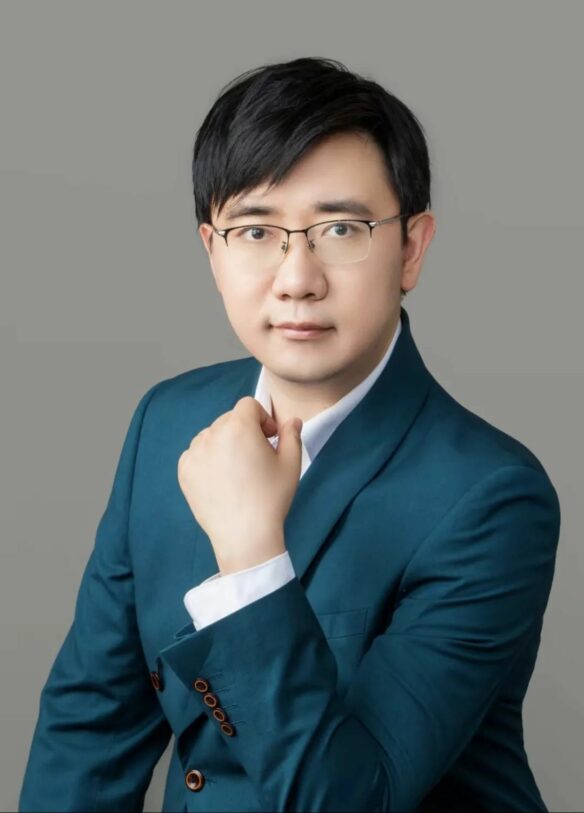
INTRODUCTION: Eight Light Minutes(8LM) Culture of Chengdu has given permission for File 770 to reprint the series of interviews with Chinese science fiction writers which they have been running this week on Facebook. The fourth in the series is a question and answer session with Baoshu, whose “Tasting the Future Delicacy Three Times” is a 2024 finalist for the Best Short Story Hugo Award.
SUPPORTING CHINESE WRITERS SERIES: 2024 HUGO AWARD FINALIST INTERVIEW WITH BAOSHU
Translated by Xueting C. Ni
Baoshu宝树 is a science fiction writer, translator, a member of the China Writer’s Association Science Fiction Committee, and a scholar of the Peking University Bergruen Research Centre. Immersed in stories related to time, he believes that every story has a real existence in one of the infinite dimensions of time and space. His famous works include the long form works Universe of Sight and Thought, Seven States of the Galaxy and many anthologies. He has published almost 1 million words of short and mid-length stories, has won multiple awards in the main categories of the Chinese Galaxy and Nebula, and his works have been translated into English, Japanese, Italian, German and other languages. He has edited the anthology History in Chinese Science Fiction, translated The Cold Equations and Star Maker. His “Tasting the Future Delicacy Three Times”, published in Galaxy’s Edge 013: Secret Room in the Dark Domain, has been nominated as a finalist for Hugo Award for Best Short Story.

Q1. Mr Baoshu, congratulations on the nomination of “Tasting the Future Delicacy Three Times” as a finalist for the Best Short Story Hugo Award. We’re delighted for you! This is affirmation and appreciation indeed for your many years of hard work in the creation of science fiction, and a point of pride for Chinese science fiction. I’d like to take this opportunity to ask you some questions, on behalf of all your fans, and thank you in advance for answering them.
Whilst you have won multiple times at the Galaxy, Nebula and Lenghu awards, this is the first time you’ve been nominated as a Hugo finalist. Could you talk a little about your award-winning history? I heard that the first award you have ever won in your literary career was the New Concept Essay Contest…
Baoshu: I took part in the first New Concept Essay Contest in 1999, but at the time it wasn’t literature that motivated me. Apparently, the winner gained extra points for the gaokao (National Exam), and would be guaranteed university entrance, but I only came second, so it wasn’t ideal, and didn’t really help with my grades in the end. But, the piece that won was published in some periodicals, got some attention in my high school, but for me it wasn’t a great thing, as the exams were imminent, it just felt like extra pressure…later though, a lot of big names came out of “New Concept”, so my small achievement was nothing to speak of.
Many years later, after I had formally settled into writing science fiction, I won several awards in the sci-fi category in succession. Of course, I was very pleased to win them, but many other science fiction writers have also won them, so it wasn’t anything special. When The Ruins of Time won the Nebula Gold in 2014, it was probably the occasion that first left a deeper impression on me, because it was the first time I’d won a heavy-weight award for science fiction. Another time was when Everybody Loves Charles won Best Novelette at the Galaxy in 2015, I remember Mr Yao Haijun saying the work was going to transcend its time. For me, it was an immense encouragement; the recent Science Fiction Planet Award for Our Martians also made me very happy, because the monetary reward was quite high.
This year, I wasn’t expecting to be nominated. I should say that a lot of factors combined to contribute to this, including the increased development of Chinese science fiction as a whole, the enthusiasm and surge in Chinese participation in the voting. It’s something that I’ve recognised quite clearly. Moreover, I just treat it as something to spur me on, to produce even better works.
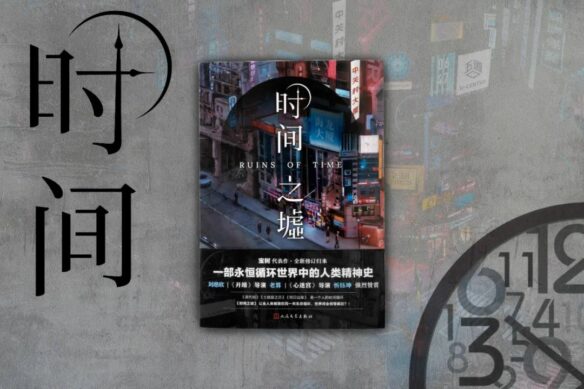
Q2. As one of the representatives of the sci-fi renaissance, you have devoted yourself to the creation of science fiction for over a decade, apparently you began writing sci-fi when you were studying your PhD in Belgium? Can you tell us how you came to dedicate yourself to sci-fi writing?
Baoshu: I’ve been a science fiction fan for many years, and tried to write a few things during university, though they didn’t take off. Perhaps it was thanks to the increased hours of leisure time during my studies abroad, that I began writing novels. Of course, at first, I was publishing them on internet forums, so I wrote whatever I felt like, including pieces contained sardonicism or caustic humour. For instance, in one of the early ones, which I later named The Cruel Equation, imagined an astronaut dismembering a girl who stowed away on his shuttle, to reduce her weight, and prevent her from dying in space…of course, I could hardly publish something like that in print. I gained some readers on the forums, and their enthusiasm encouraged me to keep writing. Some of the exchanges I had with Big Liu (Cixin) on the forums around this time, gave me a lot of encouragement.
In the summer of 2010, I wrote The Great Age, a piece of about 40,000 characters, as an independent story. Even though it was rejected by Science Fiction World, the experience of writing it gave me an inner confidence, I felt capable of completing complex stories. From this point onwards, my urge to write grew greater and greater. Not long after that, Three Body 3: Death’s End came out. I read it in one sitting, and I wanted more, so, wrote a fan fic novel called Three Body X: Redemption of Time, which somehow got the extremely fortunate opportunity to be published. From that point, more and more opportunities to publish my work came up, so this is how I “strayed” into the path of sci-fi writing.
Q3. “Tasting the Future Delicacy Three Times” is a new work you published in Galaxy’s Edge in Chinese, could you please introduce the piece, and talk a little about the inspiration behind it and your creative processes?
Baoshu: The inspiration for this story was quite plain and simple. We all love good food, especially the expensive luxuries, the rare delicacies we can’t afford. It was this universal desire that fired the imagination. No more than what the average person imagines… what would they eat, what kind of dining experiences would they have, if they ever became super rich. Science fiction provides us with another dimension to imagine: would it be possible to attain this experience from the brainwaves of someone else who was eating that gourmet dish?
The concept isn’t new, and my own previous work Everybody Loves Charles has a similar construct. But “Three Tastings” sets a limit on the other senses and concentrates the focus on taste. If only the sensation of taste is felt, with complete oblivion to everything else, what can this experience show us? Can this kind of technology find commercial use? How would it impact on society and human nature? This gives rise to infinite plotlines.
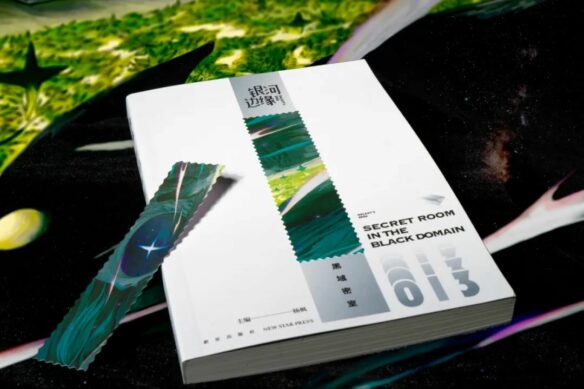
Q4. The structure of “Tasting the Future Delicacy Three Times” is quite interesting, three small stories “combined” into a complete one, a marvelous set-up that strengthens the storytelling and enriches the reading experience, how did you come to employ this structure?
Baoshu: Actually, at first, it was just a short story of about 3000 characters called “Banquet”, exploring the question “what is the pinnacle of gourmet experiences?” The managing editor liked it so much that they not only decided to publish it but commended it highly and made me feel that there was a lot more potential to be excavated from the concept. I also thought of many possible ways of interpreting it, so I wrote two more stories, each based on the previous story, taking it to the next level, so this is how we ended up with “Three Tastings”. Three small, interconnected stories making up a bigger one, which contemplates the relationship between delicious food and human nature.

Q5. “Tasting the Future Delicacy Three Times” appears to be just an engaging, humorous sci-fi story about sensations and future delicacies, but actually it’s about the future fate of humanity, it has great scope, and is very classic Core Science Fiction. Many of your works are like this, seemingly fun and light, but in fact, concern themselves with the whole fate of humanity. How did you come to form this kind of sci-fi aesthetics?
Baoshu: I think this work is mostly sci-fi, with characteristics that are very common to Core SF. Science fiction is a form that seeks to astonish and amaze, it does not stop at the level of superficial sensationalism, but, as a means of exploration and inference, it goes deeper and reaches across the whole of human society. In other words, it opens up ways of imagining, the potentials within an idea itself, like conducting a thought experiment on the entire world, a deep-level experience.
Specifically looking at “Three Tastings”, perhaps its uniqueness lies in its exploration of appetite, a facet so deeply imbedded within human nature, and intimately connected to the fate of humanity. On one hand, the development of civilisation can be seen in the evolution of gourmet dining, people wrack their brains in order to provide the physicality of their taste buds with the most exquisite experience; but on the other hand, it’s precisely because they can satisfy their appetites that humanity was able to break free of this basic instinct, to develop art, literature, philosophy…anyone who has owned a pet will know this, the craving and single-mindedness towards food in animals far exceeds that in humans. Therefore, if technology could be used to massively increase the satisfaction of the mouth and stomach, what influence will this bring to human society and human nature? This is an extremely interesting question, not detached from reality. For instance, advanced societies provide far more affordable and delicious junk food than traditional societies, which causes a lot of people to put on weight, making dieting into an industry. You could have told this to people a hundred years ago, as science fiction. Science fiction allows us to think about these questions in the most extreme of possibilities.
Q6. What’s the biggest influence on your science fiction writing? When you’re struggling to find inspiration, what do you use to “recharge”?
Baoshu: Quite a few writers have had deep influences on me, needless to say, writers such as Liu Cixin and Wang Jinkang; there’s also Zheng Wenguang. I read most of his works when I was little and, even looking at them now, while some plotlines might seem a little simplistic or formulaic, the zeitgeist and sci-fi spirit that they convey, still captivate me immensely. Quite a few of my most recent pieces explore the legacy of Zheng’s era. I also like British authors such as Olaf Stapledon and Stephen Baxter, with their vigorous and grand imaginations, they are also my mentors.
As for “recharging”, it’s difficult to say, because nothing can really guarantee that inspiration will flow. I think this is a problem that has bothered a lot of writers, it depends on the situation. Of course, the accumulative effect of reading can help. When I’m stuck with writing, watching a film, or seeing an exhibition, going travelling, having a chat with friends, having a hot bath, all of these could bring unexpected inspiration, but maybe none of them will. But no matter what, that bowstring of creativity is always taut, and never let slack. Anything and everything could become the inspiration to create.
Q7. With a PhD in Philosophy, you are the quintessential intellectual, but your sci-fi works are well loved by ordinary readers, clearly your aesthetic and reading tastes are at one with the masses, could you explain this?
Baoshu: Essentially, science fiction is an intersectional space in which all kinds of fields such as literature, science and technology, sociology, philosophy interact with each other, so the criteria to measure it must necessarily be a diverse one that accounts for appropriateness within all of them. A lot of people tend to take the “older is better” point of view, that literary fiction is superior to science fiction, or avant-garde is better than popular, or hard science fiction is superior to soft and so forth. But all these ideas are probably unfounded, or follow some unsupported theories, or in the end turn into some kind of struggle for the freedom of speech, or points of contention between opposing groups. Regarding the reading of science fiction, I suggest we maintain an open attitude, and try to accept the possibilities of all kinds of alternative science fiction. From another perspective, the main role of philosophy, according to Socrates, is to “know yourself”, a creator should understand their nature and innate talent, and write from their heart. Don’t compromise yourself by following fads, fashionable concepts or seeking validation by conforming to trends.
I have always seen myself as a down-to-earth storyteller, because of my personal academic background, I infuse my work with some philosophical thinking, but there’s no conflict between philosophical concepts and popularity, when I’m writing, they naturally flow together. There’s no need to think that philosophical science fiction is something esoteric and full of intimidatingly unintelligible terms. For instance, Our World of Science Fiction explores the relationship between the past and present, and employs Heidegger’s “Re-enactment” Theory, but there’s no need to mention these theories by name. When you have internalised the core of this philosophy, it integrates naturally with the story, and they become intricately connected.
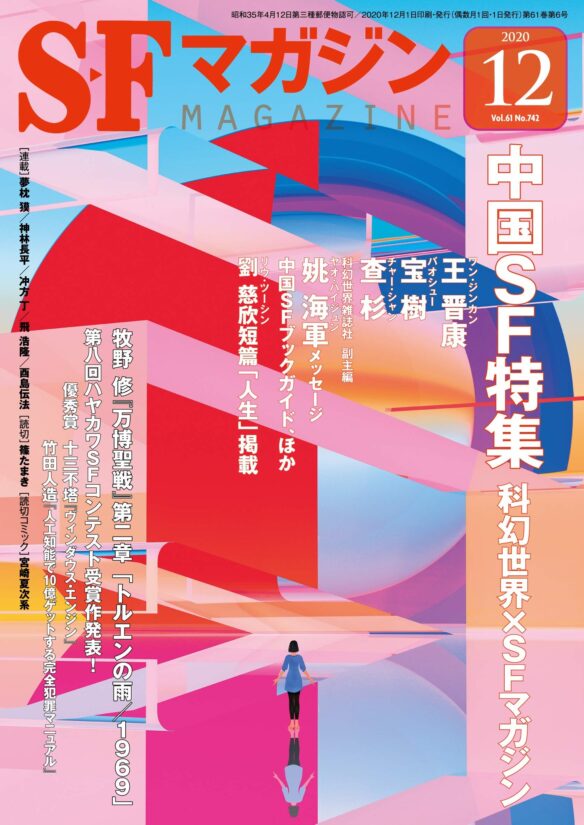
Q8. A lot of your science fiction can be categorised as humorous sci-fi, and almost all of them have some kind of amusing and comedic vibe that makes the reader smile, this makes them feel more light-hearted than a lot of other works in the genre, even if they are depicting a great crisis of humanity, they don’t feel heavy or oppressive. Is this because you yourself have an optimistic, and carefree character and a sense of humour? What do you think of the relationship between humour and science fiction?
Baoshu: you’re very observant. When my writing goes into a state of natural, unrestrained flow, it does indeed contain some light-hearted humour. This perhaps bears some relation to my own personality; I probably feel most comfortable expressing my inner self while in this state. Although I’m not stand-up material, I like to make people laugh and smile. This might not always be appropriate, for example, making a joke when things should be escalated, or during moments of aestheticism or lyricism would ruin the atmosphere, but on the whole, for the reader, when I’m at east, I can create better works.
As for the relationship between humour and sci-fi, this is a difficult theoretical question. For instance, what is the essence of humour? A lot of scholars have considered this, and there’s a lot of debate about it. Personally, I feel that that science fiction writers gravitate towards the grand, or the forefront of things, in any case, the serious aspects, whilst humour can construct a kind of offset to balance this out, and in doing so, enrich the story. However, whether it can always be employed, and how one uses it, are very personal questions.
Q9. Your novels are also very popular, for example, The Ruins of Time, Seven States of the Galaxy have both won great public acclaim, could you talk a little about the long form works you’re currently writing?
Baoshu: I’m writing a book temporarily titled Our Era of Science Fiction, it’s a novel made up of several novellas, Our World of Science Fiction, Our Dinosaur Island, and Our Martians, which have already been published, and another two or three that have been plotted out, and I’m currently writing. When complete, it will be unique. I can’t say how good it will be, but it will be unique. No one has written science fiction in this way before. Moreover, Seven States of the Galaxy II is also in the works, temporarily titled The Legend of Beiming. I hope to finish it by the end of the year.
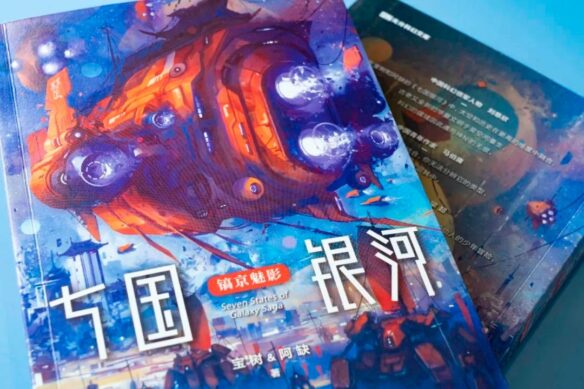
Q10. What’s a typical day for you? As a full-time writer, do you have any particular hobbies, apart from writing?
Baoshu: Usually, I write for a couple of hours in the morning, pick up my kid in the middle of the day, and read a little in the afternoon. The evening is mainly taken up with helping my kid’s studies, and if there’s time to spare, some more reading, or a trip to the cinema, followed by another two or three hours of writing in the night.
I like reading, and my tastes cover works from all kinds of areas. For a writer, this is essential nourishment, so it can’t really be called a hobby, but I’ve collected a lot of science fiction and fantasy works, about 20,000 volumes in total, so maybe be this can be counted as an obsession.
Q11. Please say a few words to the Sci-fi fans who are currently considering the Hugo Awards
Baoshu: I don’t think we need to be overly concerned about the Hugos. The fact that Three Body won it was an exceptional coincidence, even without the award, it’s still a masterpiece; yet a lot of works that have won the Hugos may not withstand the test of time. This has always been my view, but since I’ve been nominated, you can’t say it’s the sour grapes mentality.
Once up a time, the significance of the Hugo Awards was to encourage us to seek out great works, but we already have quite a good idea of the Western science fiction landscape, every year a huge amount of excellent foreign works are translated, for example Greg Egan, Alistair Reynolds, Neil Stephenson, Ian M. Banks, Peter F. Hamilton, John Varley…all these leading contemporary authors are being systematically imported, and are already providing outstanding models for science fiction. Sci-fi fans of our generation could hardly imagine such good fortune when we were children.
Discover more from File 770
Subscribe to get the latest posts sent to your email.
